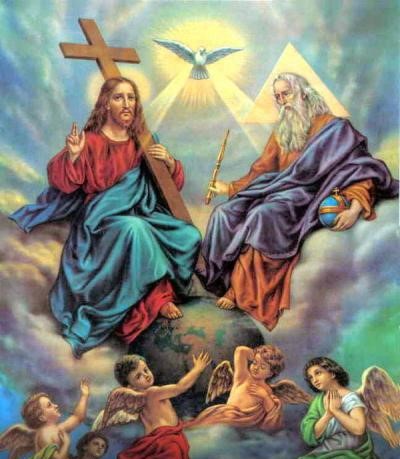
Saint of the Day for 26 May: Holy Trinity
Holy Trinity: Meaning, Doctrine and Importance in the Christian Faith
Name
Holy Trinity
Title
The Father the Son and the Holy Spirit
Recurrence
26 May
Martyrology
2004 edition
Prayer
Eternal Father behold how miserable and helpless creature that nothing can, recognizes its supreme helplessness and the infinite power of you, to it it has recourse in its needs … and in it it hopes. Gloria Patri
Eternal Son, behold this miserable and ignorant creature who knows nothing , acknowledges its supreme ignorance and your infinite wisdom, to it it has recourse in its needs … and in it it trusts. Gloria Patri.
Eternal Holy Spirit behold this miserable and ungrateful creature who deserves nothing , acknowledges its supreme ingratitude and the infinite goodness of You; to it it has recourse in its needs … to it it embraces, in You it surrenders. Gloria Patri
Patron of
Novate Mezzola, Arquà Petrarca, Osasio, Argegno, Irma, Balme, Trinità d’Agultu e Vignola
Roman Martyrology
Solemnity of the Most Holy and Undivided Trinity, on which we profess and venerate the one and triune God and the Trinity in unity.
The Saint and Mission
The Holy Trinity, the heart of the Christian faith, represents the mystery of one God in three persons: the Father, the Son and the Holy Spirit. This concept central to Christian theology is not just a dogma to be accepted, but a living reality that informs every aspect of the Church’s mission. The mission of the Church, a reflection of Trinitarian communion, is to bring God’s love, truth and salvation to all nations. The Father, the source of all creation, sends the Son to redeem humanity through his sacrifice. The Son, Jesus Christ, reveals the Father’s love and, through his life, death and resurrection, offers the way to reconciliation with God. The Holy Spirit, given to believers, continues to guide, sanctify and inspire the Church in its mission. This Trinitarian mission is lived out in the preaching of the Gospel, the sacraments and community life. Every action of the Church, from liturgy to charity, is a reflection of Trinitarian dynamism. The communion that exists between the three divine persons becomes the model for human relationships, calling Christians to live in unity and love. The Holy Trinity, then, is not just a theological mystery, but a reality that dynamically works in the mission of the Church, inviting every believer to actively participate in the divine plan of salvation and universal love.
The Saint and Mercy
The Holy Trinity is the perfect manifestation of divine mercy. In the Father, we see the original love that created the universe and continually offers forgiveness and compassion. In the Son, Jesus Christ, mercy is incarnated, taking human form to redeem humanity through the sacrifice of the cross, showing a love that welcomes and heals. In the Holy Spirit, God’s mercy is constantly renewed, guiding and comforting believers, infusing strength and hope in difficulties. This Trinitarian reality invites every person to experience mercy as a free and unceasing gift that transcends all sin and frailty. Trinitarian mercy not only forgives but also transforms, calling believers to reflect this love in their daily lives. The relationship between the Father, Son and Holy Spirit becomes the model of a love that is always ready to understand, forgive and welcome. The Holy Trinity reminds us that mercy is at the center of our faith, uniting us in a communion of love that knows no end. This communion invites us to live mercy in concrete ways, extending the same compassion we receive from God to all those we encounter.
Hagiography
The Church, after establishing several feasts honoring the individual Persons of the Holy Trinity, also established one in honor of the Three Persons. This feast was established in the first centuries of the Middle Ages by the work especially of the monks who began to celebrate it in their monasteries. From here it gradually spread to individual dioceses and finally to the entire Roman Church by Pope John XXII, who in 1314 declared it a universal feast, fixing it on the first Sunday after Pentecost. “We saw,” says Gueranger, “the Apostles on the di of Pentecost receive the Holy Spirit, and…
